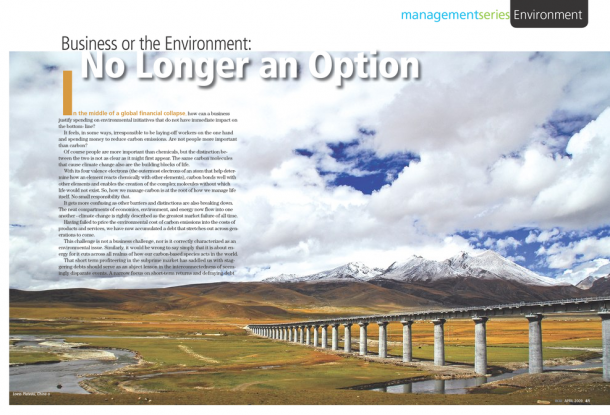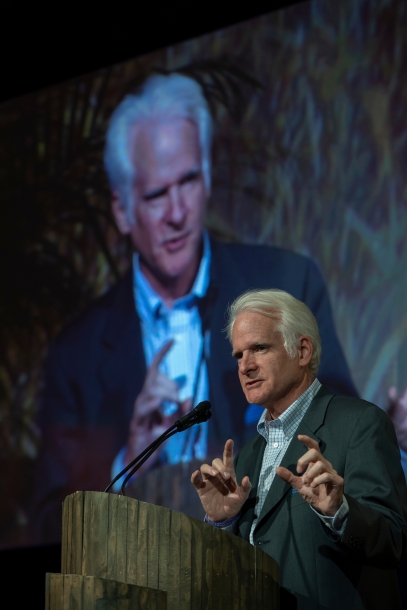You are here
Business or the Environment: No Longer an Option

April 2009
Jonathan J. Halperin
Permalink: www.aircargoworld-digital.com/aircargoworld/200904?pg=43#pg43
In the middle of a global financial collapse, how can a business justify spending on environmental initiatives that do not have immediate impact on the bottom-line?
It feels, in some ways, irresponsible to be laying-off workers on the one hand and spending money to reduce carbon emissions. Are not people more important than carbon?
Of course people are more important than chemicals, but the distinction between the two is not as clear as it might first appear. The same carbon molecules that cause climate change also are the building blocks of life.
It gets more confusing as other barriers and distinctions are also breaking down. The neat compartments of economics, environment, and energy now flow into one another - climate change is rightly described as the greatest market failure of all time.
Having failed to price the environmental cost of carbon emissions into the costs of products and services, we have now accumulated a debt that stretches out across generations to come.
This challenge is not a business challenge, nor is it correctly characterized as an environmental issue. Similarly, it would be wrong to say simply that it is about energy for it cuts across all realms of how our carbon-based species acts in the world.
That short term profiteering in the subprime market has saddled us with staggering debts should serve as an abject lesson in the interconnectedness of seemingly disparate events. A narrow focus on short-term returns and defraying debt ever more off into the future has predictable consequences that are now upon us. The bill always comes due.
Who would have thought that the sale of tract homes out-side of Phoenix would lead to the collapse of the financial system in Iceland? The economy is an ecosystem and all parts are connected. And it is also an energy system – consuming, generating, and shifting energy flows with every step, flight, movement and delivery.
And there are limits to what any system can handle – be it biological ecosystem limits, regulatory limits on markets, or capacity constraints on energy. Ignoring limits never works; respecting them drives business innovation and entrepreneurship.
While it is hard to see it when we are immersed in the details of everyday life and work, we are at an historic juncture. Past performance is not any longer a good indicator of the future.
The compass has shifted, new rules are being written, and once powerful incumbent firms are collapsing. It is as if a forest fire is sweeping through the economy, causing havoc and destruction even as it blows seed pods into the wind and generates carbon-based ash to help them germinate.
In the natural world, an intrinsic balance exists and nature’s power of adaptation and self-repair are enormous. Given a tiny crack, a ray of light and a drop of water a seed will sprout, green will creep back over brown, and life will endure.
We have seen this at scale on the Loess Plateau in China, the birthplace of the Han Chinese and the headwaters of the Yellow River.
Over the course of ten years a ravaged and denuded area the size of Belgium has been returned to full ecosystem function. Water infiltrates into the ground rather than pulling topsoil into the river; canopy has been restored; groundcover has taken hold; and fruit production is underway. The human species has worked together with the natural world, of which we are a part and on which we rely, and performed a feat no one would have believed possible.
Acting responsibly across the environmental, energy, and economic nexus is good business – and especially so at this moment when the paradigms of unlimited consumption and growth are collapsing.
Companies and people who can navigate this tough terrain will emerge as leaders in the emerging new economy, based on ecosystem principles of sustainability and adaptability.
We have choices to make – as leaders, as organizations, and as a species. Will we build walls and barriers – a proverbial Maginot Line – to keep change at bay; or will we design bridges and links to enable our children and grandchildren to look back with pride at our work with pride?
It is a choice we each make every day.
Jonathan J. Halperin is the Executive Director of The Campaign for Climate Stability, Ecosystem Restoration and Poverty Eradication – a project of the Environmental Education Media Project


